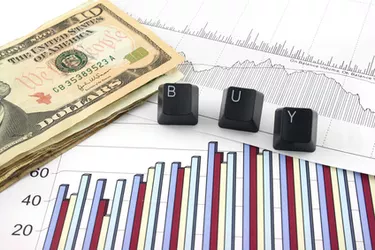
Once you make a stock purchase, you'll want to do more than just keep an eye on it to see if it's increasing or decreasing in value. You can protect your investment from a big loss with triggers, get electronic alerts to let you know when it's reached a certain price and work on your tax strategies. You can use stock analyzing websites to get an idea of how the investment might perform during the coming months or years.
Read More: Ways to Sell a Stock
Video of the Day
Video of the Day
Set Sale Triggers
After you buy stock, the share price can increase, it can stay the same or it can decrease. If you're a long-term investor and you believe that your stock will increase during the coming years, you might not want to panic-sell any time the stock price starts going down. If you do and the stock starts going back up, you'll have to buy the stock again and might not have enough money to buy the same number of shares at the new, higher price per share.
You might also have to pay fees or commissions on your sale and subsequent buy. One thing you can do to protect your money if you can't afford to lose a certain amount of money is to set a sell trigger. This is an order you give your broker or electronic trading account to sell your stock when it reaches a certain price. If you are away from the internet or your phone or don't check your stock for a few days or weeks, you won't come back and find out that you've been hurt badly by a big drop in price.
For example, if your stock price is $22 per share, you might not panic if it drops to $19 per share. If you can't afford to let the stock go to $15 per share, you can set a trigger to automatically sell your shares at $18, $17, $16 or any other number you wish.
Track Your Assets
It's important not only to keep track of your stock prices, but also to keep up to date with what's going on with the company, commodity or sector the asset is in. For example, the pandemic created a huge microchip shortage. That might be good for your chip company stock in the short run, but you'll want to keep an eye on the chip sector each week.
If chip supply is able to return to normal, your stock might not continue to throw off the big gains it realized last year. You can now invest your gains in a new stock you think has more potential. If you are invested in a tech company and a new disruptive technology is starting to replace your company's product, you might want to sell that stock and invest in the new technology when the old company's stock starts dropping in value.
Read More: How to Play the Stock Market From Home
Do Some Research
Publicly traded companies release annual reports that show the company's performance during the past year, its assets, its debt and other information, such as projected future performance and earnings warnings. In addition to annual reports, you can use the many free financial investing websites and apps available to get expert analysis and projections of where a particular stock, commodity, precious metal or other asset might be headed.
Read More: Financial Lit: Dividends
Set Your Tax Goals
If you make money in the stock market, you pay taxes (or not) based on how you manage your earnings. Not only might you see an increase in your share price, but you might also earn dividends, which are payments shareholders can receive when the company makes a profit. Dividends are in addition to your stock gains.
After you buy stock, you should talk with your tax preparer to discuss your tax strategy. This will include whether you want to reinvest any capital gains you realize or take the money out of your account, based on your personal financial goals and the tax implications of each choice you have.